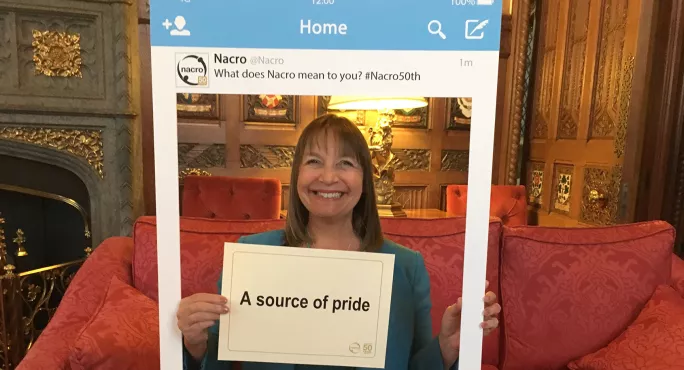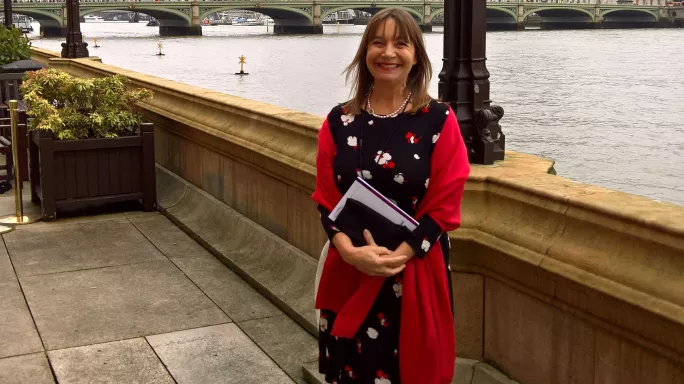- Home
- Meet Lisa Capper: Nacro’s head of education and skills
Meet Lisa Capper: Nacro’s head of education and skills

“On the estate where I grew up, there was absolutely nothing to do. It was full of children and young people and just instinctively, around the age of 11, I decided to organise them all into a summer scheme. I charged them all 10 pence, and roped in my best friend to help me run it. We had the use of two neighbours’ back gardens, and took the fence down and made it into one big back garden,” laughs Lisa Capper.
“It was basically learning and performing arts, and at the end of the summer, we did a big show for the parents. I remember thinking to myself that I’d be happy doing this forever.”
It’s clear that from a young age, Lisa Capper was destined to work in education. Decades on from those summers, she’s had a career that’s spanned across government departments, academy trusts, colleges and charities.
Today, she’s principal and director of education and skills at Nacro, a social justice charity that works with the most disadvantaged young people in our society. Re-engaging young people with education has always been at the heart of Capper’s role - but in the era of Covid-19, and with digital poverty rife among that particular group of young people, it’s a mission that’s never been so important.
Long read: ‘Bad stuff happens when I don’t have a knife’
More: How are vulnerable learners coping amid coronavirus?
Listen: How to teach learners with trauma
Capper grew up in Northwich, Cheshire, and says that she was lucky to have her mum as a strong role model. She was a headteacher at a very young age, and Capper says it was because of her mother’s aspiration and ambition that she had opportunities that many of her peers didn’t.
Capper praises the ethos of her family and the support of her parents. Her father left school at 14, and worked his way up to management at a gas board, and her brother went on to become a headteacher himself.
A family background in education
She had a traditional route through education: going to the local comprehensive school, completing A levels and then going on to Swansea University to study English and drama. While at university, she also dabbled in the music world, playing the tenor horn and singing with orchestras. It’s that creativity, she says, that can bring so much joy.
“Creativity should be really treasured because it is a lot harder for our young people to get those opportunities today through the education system because it has been narrowed so much. You get great pleasure from music,” she says.
“To have the pleasure of the arts is really helpful to people when they are having poor mental health or issues. Creating things can foster a really healthy mindset.”
Upon leaving university, Capper says that she knew she wanted to work at the grassroots level in the voluntary sector. Her first role was working with adults with learning difficulties - she set up a company with a couple of others and, as a team, they would deliver arts workshops around Cardiff. She then moved into working in a local authority to run a children’s centre before going on to work in an education charitable trust.
At the trust, she pioneered a programme called “The Share Project”, which supported parents to help their children with literacy and numeracy and ultimately gain an accreditation through the open college network. She rolled the scheme out nationally, and gained the attention of the Department for Education. The DfE funded the project and included it in the national strategy for literacy and numeracy.
Life in the civil service
Capper’s skills were recognised by the head of skills for life strategy in the DfE at the time, Sue Pember, who recruited her to be the regional director for skills for life. She says that “career-wise, it was was one of the best experiences”.
“I was working on a brand new strategy, at regional and national level, creating a whole new curriculum, rationalising all of those qualifications around English and maths, developing of functional skills, and developing things like the embedded teaching and learning materials that colleges still use today. It was an absolutely brilliant experience working as part of that team,” she says.
Capper worked at the DfE for 10 years before moving across to the Department for Business, Innovation and Skills as assistant director for FE and skills. In that role, she was asked by Pember to look at the WorldSkills event that was due to be held in London in 2011. Capper says that the UK was in a deep recession, and needed to show the world that it was open for business. As the lead official from the DfBIS for the event, she lobbied theTreasury to provide extra funding, and as a result, WorldSkills 2011 took place at London’s ExCeL centre on an “immense scale”.
Her work earned her the permanent secretary’s award in Parliament that year, which was awarded to her by Vince Cable, then secretary of state for business. She says that in the years that followed, she kept trying to leave the civil service.
“Truth be told, I’m probably not your best civil servant because I like to do things differently and be creative. I’m really focused on practice and what makes a difference on the ground, but I kept being given these great projects,” she says.
Capper worked with Matt Hancock, who was skills minister at the time, and created an independent commission on adult vocational teaching and learning, which was then included in the Skills Strategy. The commission resulted in the introduction of the Education and Training Foundation, and also the “Teach to0” campaign which focused on getting industry experts to teach in FE.
Eventually, Capper left the civil service to go and work at North Warwickshire and Hinckley College as the vice-principal, schools. In her three years in the role, she led a team that worked with hard-to-reach young people to get them back on track and into college.

From there, she moved across to Nacro to continue that mission on a national scale. The charity supports more than 3,000 hard-to-reach learners a year to re-engage with education and training.
Re-engaging young people in education
“There has been much done to improve alternative provision up to the age of 16 but then it’s often left to the individual to find their way, sometimes with less than perfect careers advice or personal support, and through what are now very large colleges, which, though brilliant, don’t suit them at all,” she says.
“Our staff motto is ‘never give up’ and last year we had 93 per cent of students go on to do work placements. The majority progress to a positive destination like work, apprenticeships, employment or further or higher education. I’m so privileged to work with strong, committed staff who make it happen.”
Capper says that young people have really felt the brunt of the pandemic and for the young people - and staff - she works with every day, it’s had consequences.
“The digital divide is real. The virus has put a real focus on social inclusion and the issues that were already there,” Capper says.
“We’ve experienced it at Nacro with some of our workforce as well because we have a housing business and we have people in prisons; they’re not highly paid members of staff, they haven’t automatically got a MacBook Air at home or the space to work.”
She says that the government’s approach to counteract digital poverty had “lots of strings attached” for FE.
“You have to spend all of your bursary, you have to use all the equipment that you’ve already got first. We give our learners Chromebooks, but then, obviously, if we gave them all out, when we came back to opening the centres, we’d have no kit. Yes, you’d hope students would bring them back, but many of our students come for a year and we progress them. So they’re not necessarily going to come back and we may never see the Chromebooks again,” she says.
Nacro has requested extra funding and has been working with BT to offer “MyFi” devices for students who don’t have access to wi-fi. Capper says for some of the students, the easiest way to work with them is to actually send them hard copy packs of work - and she says that, in some ways, they’re talking to students more than ever before because they are physically ringing them every day to check up on them.
Hope for the future
Key to their provision during Covid, Capper says, has been a message: hope for the future.
“In our safeguarding data, in the last quarter we’ve got higher instances of self-harm, higher instances of young people saying they need support for their mental health. We’d all expect to see that, but some of the individual examples are difficult to read - we need systematic support for those young people.
“We’re trying to project hope for the future: through learning, through education. However we manage to do it, you are progressing and we will get to the next stage. There is a future, we will get you back into employment, training or higher education.”
In her role at Nacro, Capper seems to have come full circle from the 11-year-old who organised learning for the children on her estate. She says that it is the “best job she’s ever had”.
“It’s the perfect combination for me of policy, lobbying, making those cases for specific change, with this very practical work on the ground. It’s a very exciting place to be. I think we do make a tremendous difference to so many individuals on a daily basis. It would have to be something quite special to top that. “
Keep reading for just £1 per month
You've reached your limit of free articles this month. Subscribe for £1 per month for three months and get:
- Unlimited access to all Tes magazine content
- Exclusive subscriber-only stories
- Award-winning email newsletters



